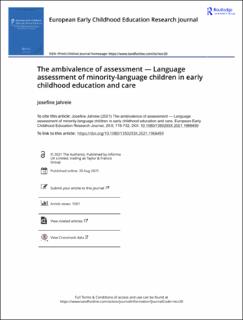The ambivalence of assessment — Language assessment of minority-language children in early childhood education and care
Peer reviewed, Journal article
Published version
Permanent lenke
https://hdl.handle.net/11250/3021213Utgivelsesdato
2021-08-20Metadata
Vis full innførselSamlinger
- Publikasjoner fra Cristin [3269]
- SPS - Documents [424]
Originalversjon
European Early Childhood Education Research Journal. 2021, 29 (5), 715-732. https://doi.org/10.1080/1350293X.2021.1968459Sammendrag
Language development in early childhood education and care (ECEC) has received increased policy attention in the past 20 years. Yet, few empirical studies have explored language assessment from the standpoint of ECEC teachers. Transnational organizations, such as the Organization for Economic Co-operation and Development (OECD), have increased their influence over national ECEC curriculums, stressing early intervention/readiness-for-school approaches to assist vulnerable groups in society. In contrast, the Nordic social pedagogy field perceives early intervention policies a threat to child-centered, playful approaches to learning. Based on interviews with 11 Danish and 11 Norwegian ECEC teachers in Copenhagen and Oslo municipalities, three main forms of ambivalence are identified: (1) ambivalence toward the ‘ready-for-school’ discourse, (2) ambivalence toward professional autonomy and discretion, and (3) ambivalence toward integration policy and the ideological code of ‘the standard child.’ The study recommends a more inclusive understanding of the implications of ‘adequate language proficiency’ and ‘school readiness.’

